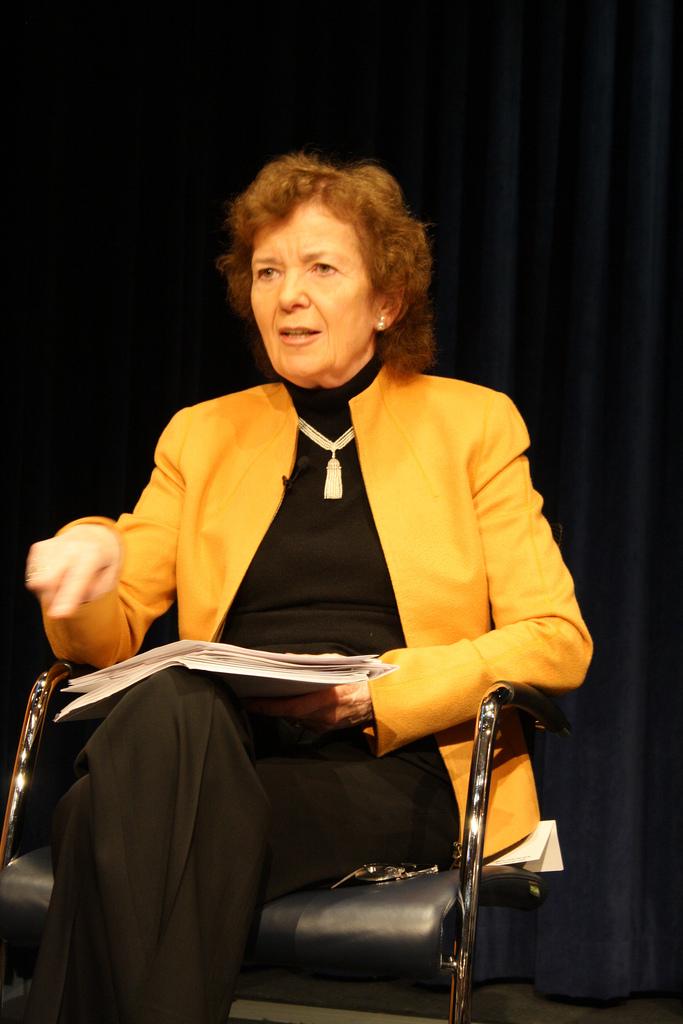A call for young people to ‘get angry’ about global warming
Mary Robinson, former president of Ireland, speaks at a panel organized by Aspen Global Health and Development on global warming and family planning on Jan. 13, 2012.
WASHINGTON, D.C. — The elder called on the younger generation to speak up.
At a session on climate change and family planning Thursday, Mary Robinson, the former president of Ireland, said that she keeps hoping that more young people will demand action on global warming.
“Maybe there’s a need to link the more thoughtful aspects of the Occupy movement with this, to get some of that more radical thinking,” she said. “As younger people increasingly understand the issues, I would say, ‘get angry’ so that we feel the need to do something more urgent. Let us know this is your future and for goodness sake it is absolutely urgent.”
She spoke at a session called “The Road to Rio: Climate Change, Population and Sustainability,” part of the Aspen Institute’s "7 Billion: Conversations that Matter" roundtable series. The discussion, organized by organized by Aspen Global Health and Development, focused on strategies leading up to the Rio+20 United Nations Conference on Sustainable Development Summit in June — as well as what should be happening beyond Rio.
Ideally, the planet could use a business plan, said Rachel Kyte, the World Bank’s Vice President of Sustainable Development.
But she said that the lack of an overarching plan to reduce global warming and to slow the population growth, which would put less pressure on the environment and reduce carbon emissions, doesn’t mean nothing is happening. She said work done by some cities to address concerns about global warming was very important.
“One of most exciting things that count is the work on the city level, from New York City to Rio to Dar es Salaam,” Kyte said. “There’s a lot going on. It’s very easy to sit back and say, ‘We don’t have a business plan for the planet. We don’t have an investment plan for the business plan.’ But if you take it one level down, to the cities, there’s an enormous amount of progress.”
Speaking as a grandmother
Still, said Robinson, much more needs to be done — and now.
“What worries me as a grandmother is the lack of a real sense of the intergenerational context we need to have to look at this,” she said. Years from now, she said she doesn’t want people to look back “at the mistakes we are making now” and think, “how could they be so stupid, how could they be so shortsighted? … It’s good there are positive things happening in cities, and in universities, on climate change. But it’s pretty shocking of what this Congress here is not talking about. They need to talk about it.”
Millions lacking access to contraceptives
At the session, which was held at the Kaiser Family Foundation, much of the discussion focused on the connection between global warming and family planning. Several pointed to a United Nations’ estimate that 215 million women want to delay or cease childbearing — roughly one in six women of reproductive age — and they don’t have access to effective contraceptive methods. In some countries, more than 50 percent of women say their last birth was unwanted or mistimed.
Carmen Barroso, regional director of the International Planned Parenthood Federation/Western Hemisphere Region, said the projection of 9 billion people in the world in 2050 is not necessarily going to happen. She said that a push to expand family planning could substantially reduce the global population, which now stands at more than 7 billion.
“There is a fatalistic approach to the 9 billion, and there is a neglect in the ways it can be addressed,” she said. “It’s one of the things we need to put on the table. This is something that policymakers can address and should address in a way that respects rights.”
Losing ground for reproductive rights
Moderator Peggy Clark, the executive director of Aspen Global Health and Development and vice president of Policy Programs at The Aspen Institute, wanted to hear from the panelists why reproductive rights for women have slid backward over the last generation. “When I look at my 18-year-old daughter, I see that we have lost ground, and reproductive health is not a mainstream issue.”
Robert Engelman, president of Worldwatch Institute, said that talking about sex and childbirth has always been difficult throughout history. But he said later in the program that part of the problem is that family planning advocates have not framed the current issue properly.
“If people understand the point that this is in a woman’s interest and allows her to drive the timing of her own pregnancies, a lot of the controversy would disappear,” he said. “People still believe when we’re talking about (reducing) population we are talking about a China-style, ‘one child per family’ policy. What we’re really talking about is reducing unwanted pregnancies.”
